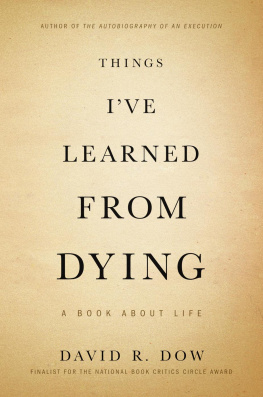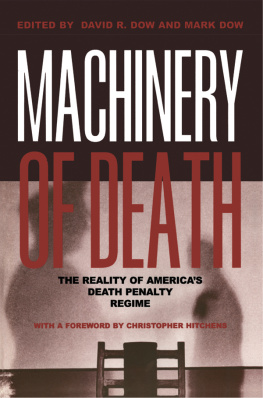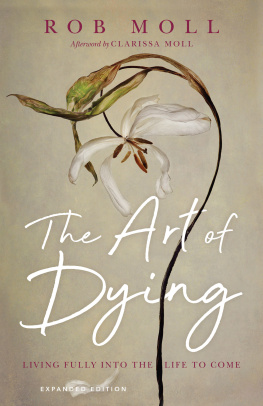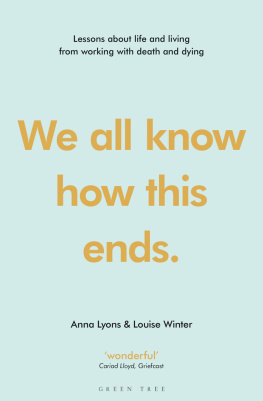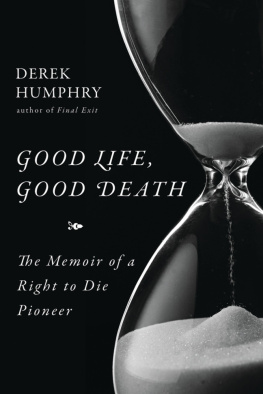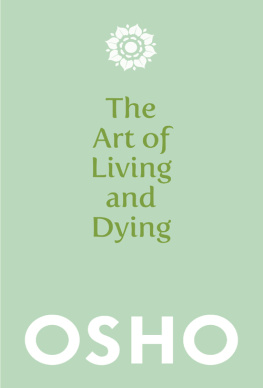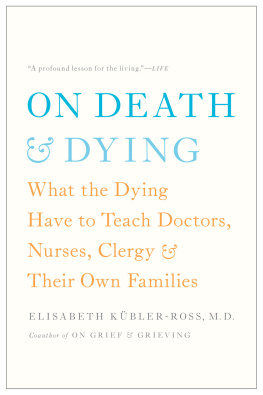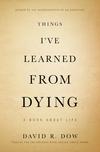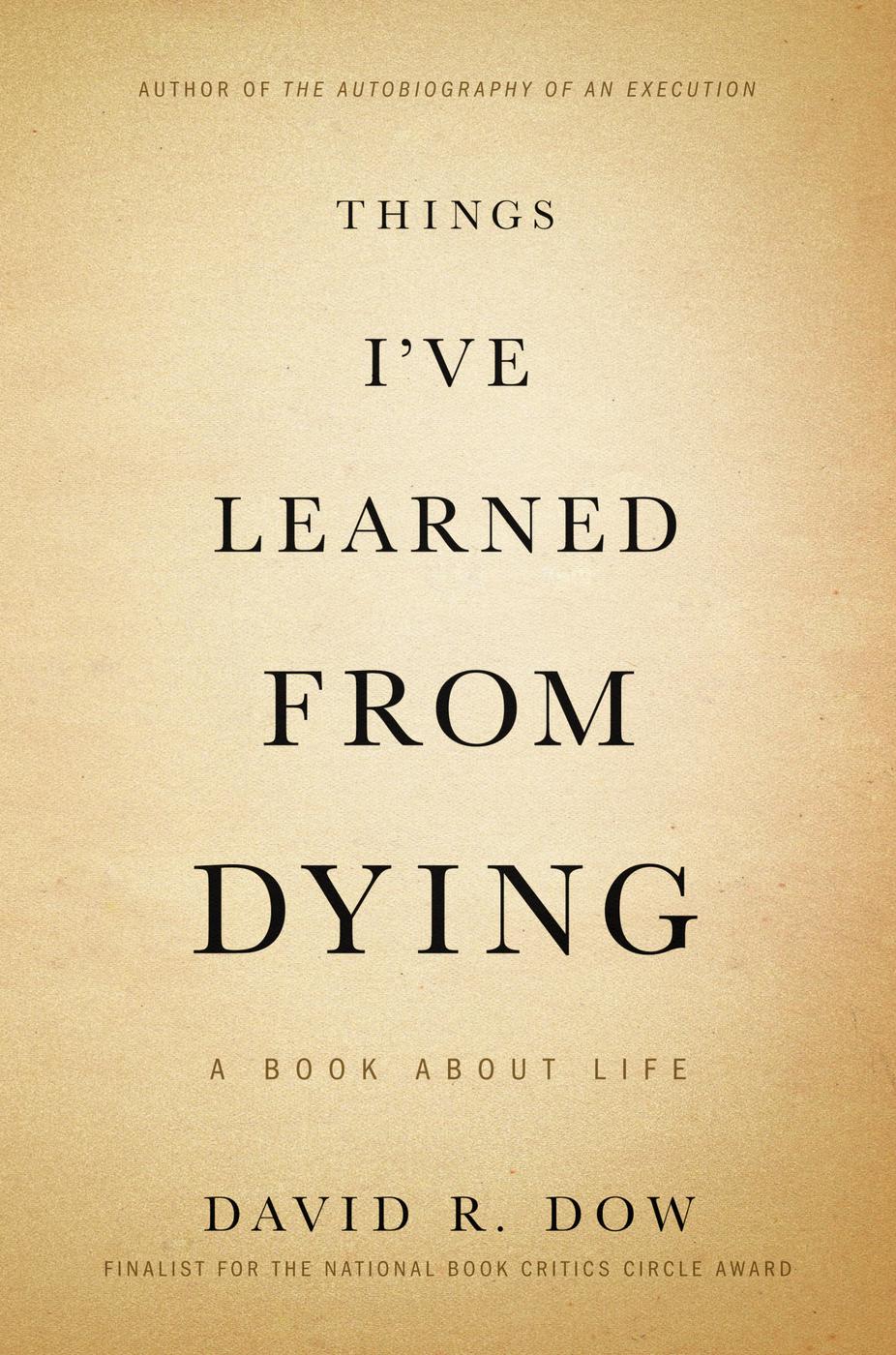
In accordance with the U.S. Copyright Act of 1976, the scanning, uploading, and electronic sharing of any part of this book without the permission of the publisher constitute unlawful piracy and theft of the authors intellectual property. If you would like to use material from the book (other than for review purposes), prior written permission must be obtained by contacting the publisher at permissions@hbgusa.com. Thank you for your support of the authors rights.
For Katya and Lincoln,
my pillars
I could write a book about what I dont know.
R YAN B INGHAM , I Dont Know
Every life is different, but every death is the same. We live with others. We die alone. And what is important to this story is that the moment we die is not the same as the moment we are perceived as dead. Our lives end before others notice, and the time that spans that distance is the inverse of the grief your loved ones will suffer when you leave them behind.
A week after one of my clients was executed, I was talking to a room full of lawyers at the state bar convention in Fort Worth. I described his final day, how he showered and shaved then put on clean clothes and took a ninety-minute van ride from death row in Livingston to the Walls Unit in Huntsville, where he was executed at thirteen minutes past six. I told the lawyers how earlier that day I watched his mother, father, sister, and brother tell him good-bye. One man asked whether they had been able to embrace. I said no, there are no contact visits with death row inmates. Another asked how long he had been on death row. I told her six years and eight months. She said, His family had six years and eight months longer to say good-bye than his victims family had.
Which is better: to be able to circle the date on a calendar five years from today when your life will end? Or to get flattened by a truck crossing the street and never see it coming? Who had the easier death: Timothy McVeigh, or his victims?
Im not going to argue with you, no matter what you say. One thing Ive learned is that the answer to the question isnt obvious.
The same sequence of days can arrange themselves into a number of different stories.
J ANE S MILEY , A Thousand Acres
I met my future father-in-law at Ruggles Grille the night Katya graduated from law school. There were six of us. Peter and Irmi wanted to drink champagne to celebrate their daughters achievement. He asked the waiter to bring us two bottles.
Peter was born in 1938. Hitler had already annexed the Sudetenland. When the Wehrmacht invaded the rest of Czechoslovakia in March 1939, Peter was wearing diapers. But on the night we met, I could not make myself picture him as a year-old toddler crawling shirtless across the floor of his nursery just outside Berlin. He came to the United States as a young adult with a Ph.D. in chemistry from the University of Munich. He had angular Teutonic features, and he spoke with a hard High German accent. I sat there sipping Tattinger, wondering what his father had been doing while my family was fleeing the Nazis, or being gassed by them.
At the age of forty, Peter traded what he loved, being a laboratory scientist, for what he despised, being a manager. I asked him why he did it. He had a wife and two children. He was holding Irmis hand. He said, The money, young man. The money. He showed us pictures of the house he and Irmi were building on the lake, his retirement home. There was a slip for his sailboat and custom-designed slots for his windsurfer and kayaks. Thirty-five years earlier, before the lines of people climbing Mount Everest looked like an ad from L.L. Bean, back in the days when backcountry hikers had to know how to pull their own brisket out of the fire, Peter had trekked across Nepal and Bhutan, giving away his penicillin to kids with dark green snot oozing from their nostrils, and being hailed as an angel when he passed through the same villages on his way back home. I asked him what was so bad about upper management. He said, You have to fire people.
My zaide, my grandfather, used to tell me you have two ears and one mouth because you are supposed to listen twice as much as you talk. By that logic, Peter had ten ears. That night he asked me what I was writing and reading; he asked what I liked most about teaching and what I liked least. He asked about my parents and wanted to know what my four younger brothers did for a living. He did not ask about my clients on death row, or why I represent them. He was too decorous to ask so intrusive a question on the night we met.
He did ask about the semester I spent in Israel. I lived in Tel Aviv. I told him about my downstairs neighbors, a young couple so German they were a caricature. Their eyes were sapphire and their hair was blond. Her breakfast was strong coffee, a pretzel, and a cigarette. He wore black socks with his tan open-toed sandals. They insisted on speaking only Hebrew, even when alone. I asked them why. Both their fathers had been Brown Shirts, so they moved to Israel and worked at an orphanage as expiation. I told Peter about them. I said, I think they were nuts.
He said, I dont think so. Not at all. What they did makes perfect sense to me.
* * *
T he thirty-two-year-old nurse was filling her tank at two in the morning at a gas station where the lone employee was a middle-age Korean man who sat on a stool in a booth behind bulletproof Plexiglas and wouldnt come out even to pee if anyone was nearby. Four young black men pulled up driving a maroon Ford LTD. One stepped out and said, Gimme the bag, bitch. She didnt even hesitate, but he backhanded her anyway, using the hand that held his gun. The clerk later told police he could hear her jaw crack. She lay on the ground, just conscious enough to register the steel toes in the boots her assailant was wearing when he kicked her in the ribs. She heard him say to the other three men in the car, Lets get the fuck out of here. Her name was Tamira, and shed never forget his voice, or his face.
It was the beginning of a weeklong bender that ended with murder on a cool fall evening in a white-flight suburb north of Dallas. The same four had parked the LTD at the curb in front of Lucy McClains Tudor-style home. One stayed with the car, the other three finished their beers, tossed the cans on the manicured lawn, and walked up to the house.
Miss McClain was upstairs in bed, watching the news and knitting. She was eighty-four years old, with rheumy blue eyes and brittle white hair. A copy of O Magazine was on the night table, under her reading glasses, next to a smudged glass of lukewarm water she planned to use to wash down her nightly pills.
Demetrius Sanders said to the others, Yall ready to do this? And he kicked in the door. He was eighteen. Eddie Waterman and his cousin, Harold Johnston, were nineteen. They led the way upstairs. The TV was turned up loud. Miss McClain probably did not hear the intruders until they entered her room. She clutched the knitting tightly in front of her breasts. She was scared, but she was calm. She told them they could have whatever they wanted. Waterman walked over to the night table. He had been a linebacker on his high school football team and had been recruited to play college ball at Oklahoma. He was massive, with short hair and a tattoo that identified his gang. Miss McClain cowered. He picked up a set of car keys.
Johnston pulled a gun from his waistband. Sanders said, What you doin, man?
Next page
